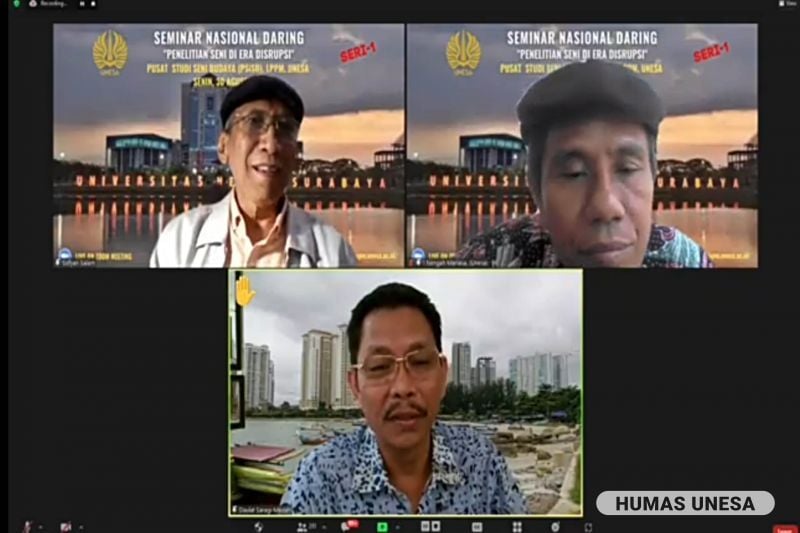
www.unesa.ac.id
Unesa.ac.id, Surabaya – The term industrial revolution 4.0 is currently increasingly adorning the mass media or social media. A situation where the movement of the industrial world is no longer linear, in fact it takes place very quickly and tends to form a new pattern of order. In the world of education, research challenges in the Disruption era are required to be able to adapt to the changes that are happening. In response to this, the Center for Cultural Arts Studies (PSiSB), Institute for Research and Community Service (LPPM) Universitas Negeri Surabaya held a National Webinar on Art Research in the Era of Disruption with the theme "New Paradigm in Art Research" on Monday (30/08/2021).
Virtually the webinar was held aimed at deepening understanding of art research in the Disruption era by presenting three speakers, namely Prof. Rahmi Dyah Larasati, Ph.D from the University of Minnesota, United State of America, Prof. Sofyan Salam, M.A, Ph.D from Makassar State University and Prof. Dr. Djohan Salim, M.Si. from ISI Yogyakarta.
Unesa Chancellor through his remarks delivered by Prof. Dr. Darni, M.Hum said that Unesa as a university that has an art study program has a responsibility to continue to capture existing opportunities in order to maintain, preserve, and develop art research, especially research on Indonesian cultural arts to be more productive. "We must go through the era of disruption together by encouraging and producing new ideas, in the future it will have implications for the accumulation of even greater changes for universities," he explained.
The material on the new paradigm of art research in the Disruption era was explained by the first speaker, Prof. Rahmi Dyah Larasati, Ph.D from the University of Minnesota, United State of America. He explained that art research offers a continuation of the spirit of critical intellectualism in conditions of universal crisis. "The universal crisis gives birth to forms of demands that force us to respond together, as if we are on an equal line of life," he explained.
This means that there is a need for policy cartography and rational logic in the art paradigm to respond to a pandemic disruption situation with space for pause considering the conditions in each different territory. "The era of disruption in our lives includes as intellectual beings, as actors and thinkers where there are always challenges," he continued.
This professor of transnationalism studies at the University of Minnesota also told about the current state of art in this European country that has returned to normal. Various art performances such as music, dance, drama, opera have been opened and held again.
Furthermore, the second material was presented by Prof. Sofyan Salam, M.A, Ph.D from Makassar State University. Through this opportunity, Prof. Sofyan said that art education research still carries the same mission, namely trying to find scientific truth in the field of art education. Where art education is an integration of the fields of science between art, pedagogy and support.
In this era of disruption, research on art is growing like digital art. This digital art is a place of expression or creation for students because it is a new research area that offers a variety of issues. "The era of disruption is not only in the context of something that is full of challenges, but on the other hand there are inherent opportunities," he said.
Research opportunities in this era of disruption have become a new research area because of the expansion of artistic creation activities and the development of learning interactions. Technical convenience in data collection and processing. Not only that, the ease of collaborating due to the internet network that can reach widely. The webinar was enlivened by the third speaker, Prof. Dr. Djohan Salim, M.Si. from ISI Yogyakarta and welcomed each other with questions from the participants. (yrs/vin)
Share It On:






